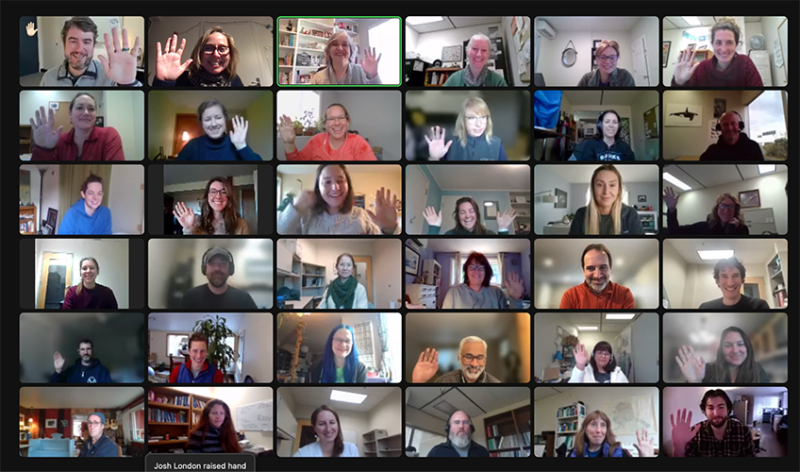Alaska Fisheries Science Center supported 39 researchers from seven divisions in their second Openscapes Champion program cohort. Openscapes is an open data science mentorship program for those who want to do better science, in less time, together.
Openscapes has helped:
- Establish center scientists as leaders in open data science
- Enhance collaborations across divisions and centers
- Ensure continuity of long-term research efforts
- Improve scientific communication with stakeholders
This valuable training opportunity provided participants with a space to explore different ways to do data analysis, management, and oversight as an integrated effort. The training opportunity also allowed scientists to develop contemporary project management skills, cultivate communities of practice and inclusive research teams. This cohort coincided with Openscapes Champion cohorts based at four other NOAA Fisheries science centers. It provided unique opportunities for training, professional development, and coordination across the agency.
“The Openscapes platform presented an opportunity to explore coworking in a virtual environment,” said participant Kimberly Rand. “Virtual meetings have become commonplace; however, using collaborative tools (e.g. GitHub), and sharing screens to write or code together as a team is something new that I have not participated in before. This removed the ‘barriers’ to truly collaborative research, even though our team is geographically spread out.”
The participants met on virtual calls and smaller group collaborative meetings from October to December 2022. All teams honed their skills in:
- Improving analysis workflows, report writing, and manuscript preparation
- Promoting a culture of inclusivity and collaboration; transparency and reproducibility
- Improving on- and off-boarding processes
- Integrated project management
The teams focused their energy on important research issues including fishing tagging, fisheries surveys, marine mammals, genetics, shellfish, fish life history, and survey preparation.
Openscapes Has Something for Everyone
Participants found this mentorship program to be transformative, and the training created an environment that nurtures continued education. “Ultimately, we all benefit,” said Dr. Margaret Siple, research fisheries biologist and program mentor. “People aren’t continually reinventing the wheel in a vacuum. They are working together to share their knowledge and experiences, and learn from each other. This makes for a more collegial workplace and improved efficiency at the center.”
Siple, along with Dr. Josh London and Emily Markowitz, first proposed establishing an Openscapes cohort in 2021, during the height of the COVID-19 pandemic. Openscapes, and its platform, is an obvious asset for the remote-work landscape. Since then, two cohorts of Alaska Fisheries Science Center staff have gone through the program.
“I learned to organize workflow in one virtual space and define and distribute work tasks amongst the team members. That will be a great tool for our group,” said Susanne McDermott.
The lessons learned from Openscapes extend beyond the virtual working environment. They have radically changed how staff, even as they begin returning to the office, approach science and the center’s mission of supporting sustainable fisheries management and protecting marine mammal populations.
What’s Next: Openscapes 2023?
The three mentors are working with center leadership to continue supporting future Openscapes training. They see it as essential for staff’s professional development and with added benefits to the center’s continued organizational excellence. They are discussing the logistics of a third Openscapes cohort at the center. In the meantime, the mentors have teamed up with NOAA Fisheries leadership to support a cross-agency 3-year Openscapes cohort for all NOAA Fisheries science centers. It supports the White House’s 2023 Year of Open Science initiative.
“We really appreciate the efforts of Megsie, Josh, and Emily in serving as mentors for the program and leading the center in this important effort,” said Jeremy Rusin, deputy director, Alaska Fisheries Science Center. “It has so many benefits for staff and the center as a whole by furthering collaborations, ensuring continuity of long-term research efforts, and improving scientific communication to all stakeholders.”


